Norland: How to take care of peasants needs?
The figures dressed in green are representatives of the peasantry in Norland. They are the majority of your kingdom, so it is important to take care of good relations with them. On this page, we will give you basic information related to the peasants, and help you control their moods.
Last update:
Peasants are the most numerous and, in many respects, the most important part of society in Norland. These green-clothed characters are the main driving force behind agriculture, production, and often, the army. Maintaining good relations with peasants and meeting their needs is crucial to creating a well-functioning state. On this page, we describe all the most important mechanics related to this social group, and we also explain how to gain the trust and loyalty of your subjects.
- What do peasants do?
- What is the mood of peasants and how to influence it?
- How to manage peasants' finances?
What do peasants do?
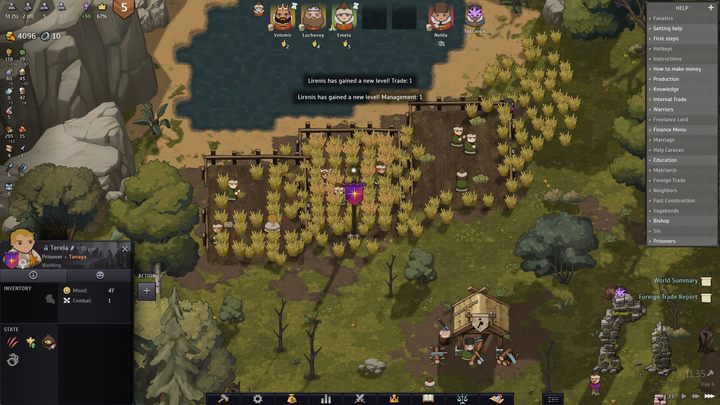
Peasants are the largest class in almost every kingdom in Norland. They dress in green clothes and daily maintain the basic infrastructure of the kingdom: they work in the fields, produce food and other goods, and build new buildings. You cannot control them directly, but their actions are coordinated by lords to whom you can give commands.
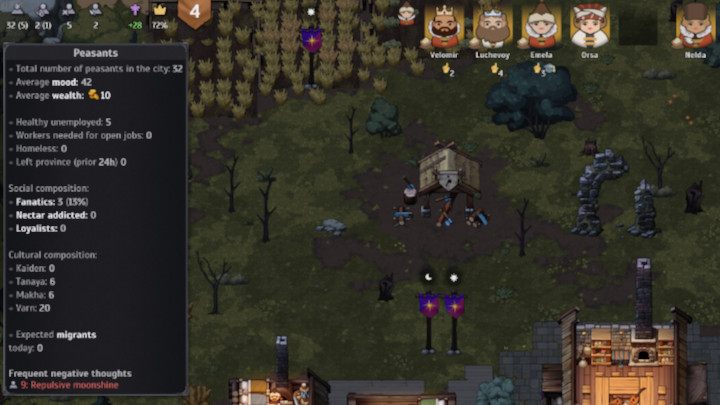
You can view statistics related to peasants by clicking on the little man icon in the upper left corner of the game screen. The number directly below the symbol indicates how many peasants live in your city, and the number in brackets tells you how many of these people are unemployed.
In the summary window, you will find information about the wealth of your peasants, as well as details about individual subgroups such as fanatics, nectar addicted, and various cultural groups. You will also find the average value of peasants' mood.
What is the mood of peasants and how to influence it?
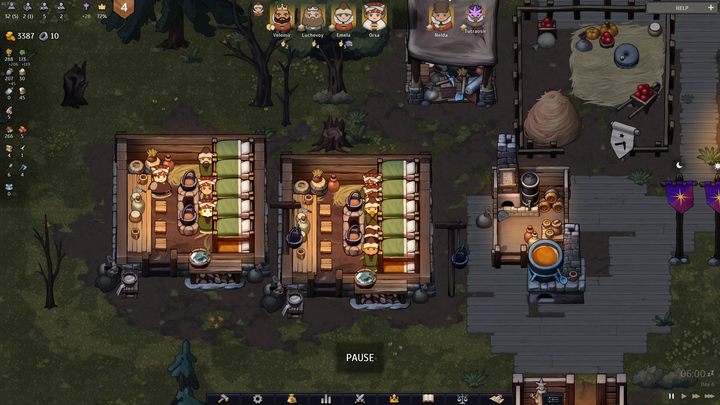
The mood of peasants, similar to that of lords (you can read more about them on this page of the guide), is the average level of life satisfaction. It depends on meeting four basic criteria. These are:
- Sleep - regenerated during night rest. The peasants will usually take care of that themselves and your only task will be to arrange comfortable places for them to sleep (dormitory);
- Food - a low level of this need may even lead to starvation. The daily value is met by peasants eating 1 unit of food (e.g. rutabaga), which they will buy after work - if it is available on the market and they can afford it.
- Rest - is related to mental relaxation and is achieved through inactivity (quite slowly) or by drinking alcohol (much faster). While a low Rest value is unlikely to result in the peasant's death, it will significantly lower his mood. If the peasant has satisfied his hunger for the day, he will try to buy alcohol in the tavern (if available) with the remaining money.
- Piety - the need for spiritual fulfillment. It's fulfilled automatically during prayer, but a much more effective way to gain it is at special altars and temples. To construct the latter, you will need to deepen your knowledge in the library.
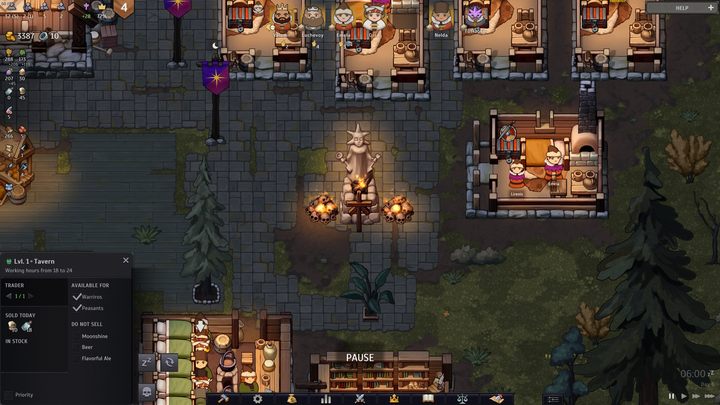
As you can see, the four basic needs are usually met by peasants on their own. However, your task will be to provide them with the opportunity to do so. Therefore, take care of the appropriate infrastructure by constructing buildings, marking out a sufficient number of agricultural fields, providing alcohol, and building temples.
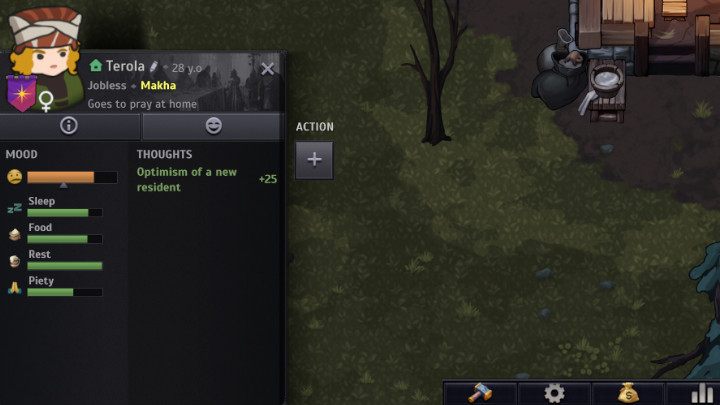
Failure to meet basic needs can lead to negative thoughts. You can view the thoughts of a single peasant by clicking on him and then selecting the "Mood" tab in the character window. Positive thoughts are marked in green and negative ones in red. Next to each of the thoughts you can also see how much they affect the overall mood of the given character.
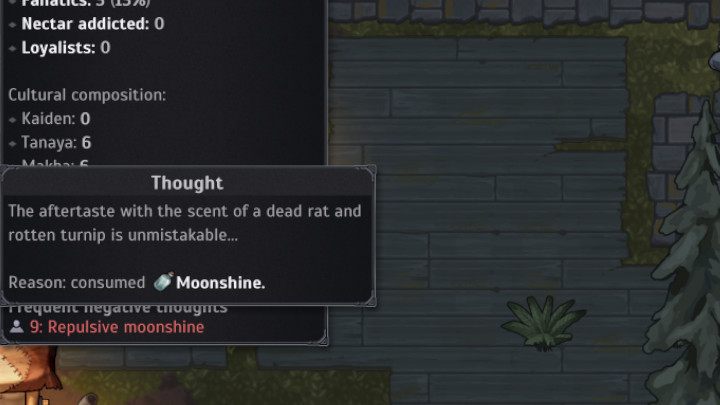
Instead of monitoring the mood of each citizen individually, you should focus on the table available in the upper left corner of the screen. At the very bottom, you will find a summary of the residents' negative thoughts that appear most often. Many peasants having the same thought usually indicates a problem that you should address as soon as possible.
Often, problems that arise may concern quite crucial things, such as lack of places to sleep or lack of food. In such cases, it will be necessary to quickly address the problem by improving the infrastructure. However, more developed towns may, over time, fall victim to more complicated problems. Our experience shows that peasants quickly lose interest in rutabagas and moonshine, the basic food products in Norland. The solution to this problem is to quickly organize the production of more exquisite products such as flour, meat, or beer. To accomplish this, however, additional investments will be necessary in structures such as a rye and hop plantation, a mill, a pig farm, or a brewery.
How to manage peasants' finances?
By controlling the needs of the inhabitants of your kingdom, you will certainly have to adjust their wages and the prices of basic goods. To do this, go to the "Finance" tab in the lower part of the game screen (third tab from the left).
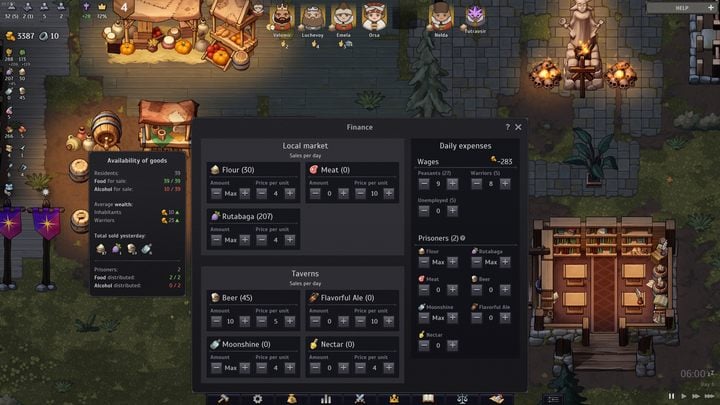
In the window, you will be able to adjust how much your peasants will earn while working, as well as how much the basic products needed for life will cost. In the section on the right, under the word "Wages," you can adjust the salary of each social class in your city (peasants, warriors, and the unemployed).
- Make sure that each peasant earns enough money to be able to buy one unit of food once a day, and the remaining money will also allow him to buy some alcohol once every few days (which increases the rest bar).
- Determining salaries requires proper balance. Citizens will become frustrated with wages that are too low, but overly generous payments can quickly lead your country to bankruptcy.
- Once your country begins to prosper, you can start considering increasing the salaries of peasants so that they can build private savings, which has a positive impact on the social mood. You could also consider organizing aid for the unemployed.
In the "Finance" tab, you can also adjust the daily food ration for prisoners. Prisoners eat for free, but that doesn't mean their needs should be ignored. Low satisfaction of prisoners may lead to rebellion. You can find more about prisoners on the What to do with prisoners? page guide.
The left side of the finance tab is used to adjust the prices of given goods. The note below "Amount" is used to determine how many products of a given type are to be offered for sale in one day. The "price per unit" determines the exact value of a single unit.
- Make sure that each peasant (even those without previous savings) can meet their needs.
- If negative thoughts about monotonous food (rutabagas and moonshine) arise among peasants, try to adjust the price of better goods (beer and flour) so that they can afford them.
You are not permitted to copy any image, text or info from this page. This site is not associated with and/or endorsed by the developers and the publishers. All logos and images are copyrighted by their respective owners.
Copyright © 2000 - 2025 Webedia Polska SA for gamepressure.com, unofficial game guides, walkthroughs, secrets, game tips, maps & strategies for top games.
